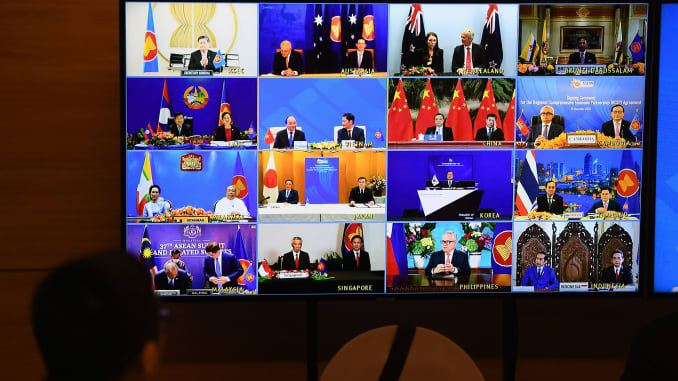- Joined
- Jul 22, 2013
- Messages
- 11,506
- Points
- 113
Yeah asia ruoes the world. Retard alert
Calm down. China is just rearranging the chairs on the deck of the sinking Titanic, or applying makeup to the corpse to make it more presentable for the funeral.
By the way, the 'USA kicked out' part will eventually prove to be quite prophetic, even though it won't happen in the way the pro-Tiong people have in mind.
Tiong dog masturbating again?Cheena wins, USA loses. Sinkapore soon red communist china vassal state. Nothing can stop red wave from taking over
https://www.cnbc.com/2020/11/15/asia-forms-worlds-biggest-trade-bloc-excluding-us.html
Asia forms world’s biggest trade bloc, a China-backed group excluding U.S.
PUBLISHED SUN, NOV 15 20202:38 AM EST
KEY POINTS
- Fifteen Asia-Pacific economies formed the world’s largest free trade bloc on Sunday, a China-backed deal that excludes the United States.
- The Regional Comprehensive Economic Partnership (RCEP) was signed at a regional summit in Hanoi.
- RCEP may cement China’s position more firmly as an economic partner with Southeast Asia, Japan and Korea.

Representatives of signatory countries are pictured on screen during the signing ceremony for the Regional Comprehensive Economic Partnership (RCEP) trade pact at the ASEAN summit that is being held online in Hanoi on November 15, 2020.
NHAC NGUYEN | AFP | Getty Images
Fifteen Asia-Pacific economies formed the world’s largest free trade bloc on Sunday, a China-backed deal that excludes the United States, which had left a rival Asia-Pacific grouping under President Donald Trump.
close dialog
Stream live CNBC TV from around the world.
START FREE TRIAL
Invest Like A Pro
The signing of the Regional Comprehensive Economic Partnership (RCEP) at a regional summit in Hanoi, is a further blow to the group pushed by former U.S. president Barack Obama, which his successor Trump exited in 2017.
Amid questions over Washington’s engagement in Asia, RCEP may cement China’s position more firmly as an economic partner with Southeast Asia, Japan and Korea, putting the world’s second-biggest economy in a better position to shape the region’s trade rules.
The United States is absent from both RCEP and the successor to the Obama-led Trans-Pacific Partnership (TPP), leaving the world’s biggest economy out of two trade groups that span the fastest-growing region on earth.
By contrast, RCEP could help Beijing cut its dependence on overseas markets and technology, a shift accelerated by a deepening rift with Washington, said Iris Pang, ING chief economist for Greater China.
RCEP groups the 10-member Association of Southeast Asian Nations (ASEAN), China, Japan, South Korea, Australia and New Zealand. It aims in coming years to progressively lower tariffs across many areas.
The deal was signed on the sidelines of an online ASEAN summit held as Asian leaders address tensions in the South China Sea and tackle plans for a post-pandemic economic recovery in a region where U.S.-China rivalry has been rising.
In an unusual ceremony, held virtually because of the coronavirus pandemic, leaders of RCEP countries took turns standing behind their trade ministers who, one by one, signed copies of the agreement, which they then showed triumphantly to the cameras.
“RCEP will soon be ratified by signatory countries and take effect, contributing to the post-COVID pandemic economic recovery,” said Nguyen Xuan Phuc, prime minister of Vietnam, which hosted the ceremony as ASEAN chair.
RCEP will account for 30% of the global economy, 30% of the global population and reach 2.2 billion consumers, Vietnam said.
‘Historical breakthrough’
China’s finance ministry said the new bloc’s promises include eliminating some tariffs within the group, including some immediately and others over 10 years.
There were no details on which products and which countries would see immediate reduction in tariffs.
“For the first time, China and Japan reached a bilateral tariff reduction arrangement, achieving a historic breakthrough,” the ministry said in a statement, without giving further details.
The deal marks the first time rival East Asian powers China, Japan and South Korea have been in a single free trade agreement.
Despite being outside RCEP and having been in the administration that propelled the TPP, President-elect Joe Biden - Obama’s vice president - is unlikely to rejoin the TPP anytime soon, analysts said, as his government will have to prioritize handling the COVID-19 outbreak at home.
“I’m not sure that there will be much focus on trade generally, including efforts to rejoin” the TPP successor grouping, “for the first year or so because there will be such a focus on COVID relief,” Charles Freeman, senior vice president for Asia at the U.S. Chamber of Commerce said this month.
RCEP “will help reduce or remove tariffs on industrial and agricultural products and set out rules for data transmission,” said Luong Hoang Thai, head of the Multilateral Trade Policy Department at Vietnam’s Ministry of Industry and Trade.
The pact will take effect once enough participating countries ratify the agreement domestically within the next two years, Indonesia’s trade minister said last week.
For China, the new group, including many U.S. allies, is a windfall largely resulting from Trump’s retreat from the TPP, said ING’s Pang.
India pulled out of RCEP talks in November last year, but ASEAN leaders said the door remained open for it to join.
Tiong dog masturbating again?

With 40 days to go until the end of the Donald J Trump Presidency, its important to note the Chinese DID NOT keep to their end of the Trade Agreement.
This is why China is now very upset Trump has lost. They know dealing with Joe Biden will be harder.
https://www.brookings.edu/blog/orde...gain-how-the-us-china-trade-war-hurt-america/
More pain than gain: How the US-China trade war hurt America
aiyoh this china taking jobs from our island again

Go fuck your motherYour mastubation got ejaculation or no ?
